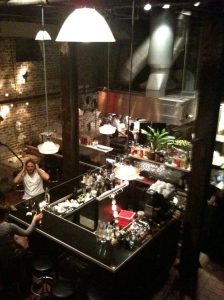
In the last blog I wrote about vision, ongoing education and clear expectations. In this part I will look at two more elements of the Boiler Room program.
Feedback and Follow up
Part of many family meals included a talk about what went well and what went wrong in the previous service. We were given instructions on how to improve, and given compliments on when we did well. Sometimes the feedback was hard to receive, as the demands seemed unreasonably high, however, this clear communication became a motivator to achieve the goal.
We also received ongoing feedback throughout service. One example comes to mind. I came to the expediting counter and Chef asked me why I always touch my face or hair when a guest asks a question. I was unaware that I was doing this. Paul encouraged me to keep control of my hands to maintain the calm, collect and confident appearance. In truth, when I returned to my tables, I was quite self conscious, concerned about my hands, but in the end, through a lot of on going feedback from Paul, I was able to maintain appropriate posture throughout service.
Often without feedback, we are unaware of our errors and even more unaware of our skills. Once Paul said something like, “you are really good at selling this wine, why don’t you study something else and sell that.” Then he told be a bit about a bottle and challenged me to sell. This feedback built on a skill and not on a fault. The ongoing feedback can seem overwhelming at times, for both leaders and team members, but it promotes ongoing growth and prevents us from getting stuck. Providing feedback about what we are doing well promotes even more expressions of that skill.

Growth Through Graduation
The final element of leadership is a value that I believe is foundational to how Kulik led. This value is this: He believed that people who work at his restaurant should quit. He believed that if he wasn’t losing people, he wasn’t doing his job.
Now, let me clarify. The goal isn’t to make people mad, or overwhelm them, or drive them away.
The goal is to help people develop their skills, their passion and their vision, so that for some, the next logical step is to move on. For some, it is to move on and open their own space. For others it is to bring the knowledge and skills to another concept and help that concept grow. For people like me, it is to take the experience and apply it to other areas. The goal is that people who are a part of the Boiler Room program should become more skilled, more knowledgable, more passionate about their craft, than at any other program around.
Paul counted on losing people, but for him it is gain. Gain because people who are growing are benefiting his business. Gain because people who are growing are bringing their best every day. Gain because people who are leaving, are to a degree, extending the values of the program. Gain because the community at large benefits from people creating new exciting projects.
Among Boiler Room alumni we have people who have moved on and helped develop outstanding bar and wine programs at other spots. Chefs who have expanded their skills beyond what Boiler Room could offer. We have people who have started their own dream restaurant. Others have gone on to work at some of the top rated places in the world. Others have stayed and continued to raise the standard of excellence and creative expression. This reproduction, not of Paul prototypes, but of people who are empowered and passionate, is certainly something that is desired of a leader.
